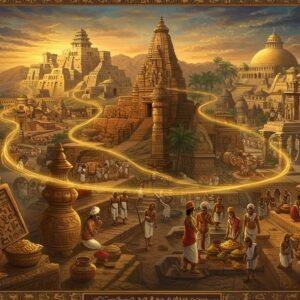Exploring the Life and Family of Ashoka the Great

Ashoka the Great, also known as Asoka, the third emperor of the Maurya dynasty, reigned over India from approximately 268 BCE to 232 BCE. Grandson of Chandragupta Maurya, the dynasty’s founder, Ashoka governed a substantial portion of the Indian subcontinent. His reign is marked by a profound transformation following the Kalinga War, leading him to embrace Buddhism and renounce violence. This exploration delves into Ashoka’s family and relationships, providing insights into the personal life of this influential ruler.
Ashoka’s Lineage and Close Relationships
Who was Ashoka’s Father?
Bindusara, Ashoka’s father, was the second Mauryan emperor, ruling from 297 to 273 BCE. Known as Amitraghata, “slayer of enemies,” Bindusara considerably expanded the Mauryan Empire. Though historical accounts are limited, Bindusara’s reign established the foundation for Ashoka’s rule. His administrative approaches and relationship with his father, Chandragupta Maurya, significantly influenced Ashoka’s governance.
Who was Ashoka’s Mother?
Subhadrangi, also known as Dharma, Ashoka’s mother, held a key role in his formative years. A Brahmin woman from Champa, she considerably shaped Ashoka’s upbringing. Stories and legends emphasize her wisdom and compassion, values that likely contributed to Ashoka’s conversion to Buddhism. Historical texts mention her with variations in her name.
Who were Ashoka’s Wives?
Ashoka had multiple wives who played significant roles in his life. Devi, also known as Vedisa Mahadevi, his first wife, was the mother of Mahendra and Sanghamitra. Asandhimitra, his chief queen, played an important role in the Mauryan court. Other wives, including Padmavati and Tishyaraksha, also held significant positions in Ashoka’s life.
Who were Ashoka’s Children?
Ashoka’s children, both sons and daughters, carried forward his legacy. Mahendra (Mahinda) played a crucial role in propagating Buddhism in Sri Lanka. Sanghamitra, along with her brother, significantly contributed to the spread of Buddhism. Other children, such as Kunala, Jalauka, and Tivala, held roles within the empire and have historical significance, their lives surrounded by legends and historical records.
Ashoka’s Siblings and Their Influence
Ashoka had several siblings who impacted his early life and ascent to power. Susima, his elder brother, was a prominent rival for the throne, and their rivalry significantly affected Ashoka’s rise to power. Vitashoka, another brother, is believed to have become a Buddhist monk. Other siblings and half-siblings held positions within the Mauryan court.
Ashoka’s Legacy and the Significance of the Ashoka Tree
The Ashoka tree, or Saraca asoca, holds cultural and religious significance, often associated with love, fertility, and divine feminine energy. It is believed to have healing properties and is used in traditional medicine. Poojn.in offers various products related to the Ashoka tree and other items for spiritual practices.
Poojn.in: Supporting Your Spiritual Journey
Poojn.in, India’s leading spiritual and cultural goods store, provides a wide range of products to support your spiritual practices. Whether you are seeking items for personal reflection, ritual ceremonies, or honoring the legacy of figures like Ashoka the Great, poojn.in offers a diverse selection to meet your needs. Explore our collection and discover how we can help you connect with your spiritual heritage.
-
Pure Ashoka Chal Powder: Discover the purity and significance of Ashoka Chal powder, ethically sourced and prepared according to traditional methods. Ideal for use in rituals, ceremonies, or as a natural remedy.
-
Cotton Pooja Asan: Create a sacred space for your spiritual practices with a pure cotton Pooja Asan. Available in various colors and sizes, these asans provide comfort and support during meditation and prayer.
-
Camphor Tablets: Enhance the purity and sanctity of your rituals with 100% pure camphor tablets. These tablets are ideal for aarti ceremonies and creating a purifying atmosphere.
-
Ghee for Hawan: Perform Hawan ceremonies with pure Maya Ghee, specially prepared for sacred rituals. Ensure the authenticity and purity of your offerings with this high-quality ghee.
Further Exploration of Ashoka and Related Topics
For those interested in learning more about the Ramayana, its characters, and the timeless lessons it offers, Poojn.in provides insightful blog posts:
Explore the rich history of Indian temples and architecture:
- Kandariya Mahadeva Temple: Religious Importance and History
- Sas-Bahu Temples: A Guide to Their Architectural Wonders


